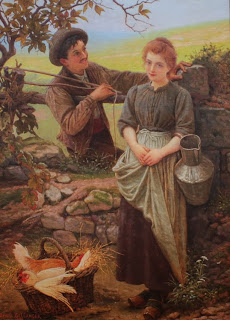 |
| Painting of John & Priscilla Alden |
What do we know for sure?
Migrating Adolescent girl meets Ship's Cooper; Is it True Love?
The oldest girl on the Mayflower passage was Priscilla Mullins. She was 17 years old. She came with her parents, Puritans William and Alice Mullins, and a brother, Josepeh. Not a lot is known about Priscilla as a girl. She survived the horrible first winter when many of the company died, so she must have been an very healthy young lady indeed. This we do know for certain, as historic documents support it. Priscilla Mullins married John Alden, a cooper who was hired on as a crew member of the Mayflower during it's docking at South Hampton. John Alden was not a member of the pilgrim party setting out on this adventure, and when they landed, he was told to go or stay as he wished. He chose to stay. We don't know why, but speculation, and romantic imagination could easily make the reason his affections for Miss Mullins!Longfellow's Implication: The Courtship of Miles Standish
Henry Wadsworth Longfellow is a descendent of Priscilla Mullins and John Alden. He wrote the poem, The Courtship of Miles Standish, in 1858. It was claimed that he wrote this from part of a family history handed down by oral tradition (ah family legends!). It involves a love triagnle between three pilgrims.
Imagine that! Those stuffy old pilgrims falling in love?
Here's the gist of the love story: Miles Standish and John Alden, being single men, shared quarters in the village. Miles Standish, a military captain, was rather rough and intimidating. Both men had a fancy for the young, single Priscilla Mullins. Miles coerced his friend, John Alden, to go speak to Miss Mullins for him, to tell her of his wish to marry her and to outline all the reasons she should do so. John went to visit Pricislla, himself being smitten with her, but determined to deliver the message to the young woman on behalf of his friend, Captain Standish. As he meets with her, he goes on and on, plying her with all the reasons she should marry Captain Standish:
Excerpt from "The Courtship of Miles Standish" by Henry Wadsworth Longfellow, 1848 :
Till at length she exclaimed, interrupting the ominous silence: "If the great Captain of Plymouth is so very eager to wed me,
Why does he not come himself, and take the trouble to woo me?
If I am not worth the wooing, I surely am not worth the winning!"
End of excerpt.
NOTE, If you wish to read the full dialogue excerpt of this pivotal exchange between Alden and Miss Mullins, click on the tab at the top right hand side of the webpage.
The story goes on, with John Alden arguing at length about all the virtues of his rival for the lady's affections, Captain Standish. He talks about how brave the captain is, how he comes from noble stock, even outlining his ancestry a little to impress Miss Mullins. He talks about how any woman in the colony, nay, any woman in England would be proud to be the wife of Captain Standish. Alden goes on and on in the poem, until finally the wise Priscilla stops him cold with an important question:
'Archly the maiden smiled, and, with eyes overrunning with laughter, Said, in a tremulous voice, "Why don't you speak for yourself, John?"
Indeed! Why didn't John Alden speak for himself. Priscilla didn't want to marry a stuffy old military man who claimed he had not the time himself to woo her. Smart girl. After this, the poem relates that John Alden and the Captain have a falling out, because the hot headed captain feels his friend 'betrayed' him somehow by having feelings for the girl himself. In the end, Priscilla married John Alden. So there you have it, a little bit of speculation, a little bit of folklore handed down from oral traditions from one the Alden family descendents, Longfellow, an epic poem, quite long by the way. I could not give the entire excerpt here, but if you enjoy reading classic poetry pick up a copy of Longfellow's works and dive in. (Check the tab above right for an excerpt of the poem)
Famous Descendants
Priscilla married John Alden, and they had many descendants, many of them famous people. Aside from Longfellow, some of the notable descendants of this true life couple are Marilyin Monroe, Orson Wells, Vice President Quayle, Adlai Stevenson III, John Adams, Frank Nelson Doubleday (founder of Doubleday Publishing) and Dance Teacher Martha Graham. Impressive, to say the least.For more info on the Alden family click here
Happy Thanksgiving, Everyone. Hope you enjoyed this little backtrack into the story of the pilgrims, with romance as the subject.









.jpg)